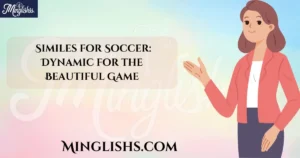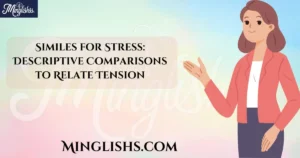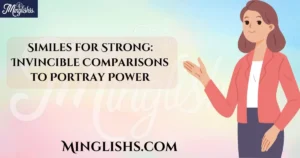“Communicate with clarity and variety, and you’ll leave a lasting impression.”
In our fast-paced world, effective communication is vital for maintaining relationships and building connections. The phrase “I will be in touch” is commonly used to convey that you will reach out to someone in the future.
However, relying solely on this phrase can make your communication feel repetitive and uninspired. By incorporating alternative expressions, you can enhance your conversations and leave a positive impression on your listeners.
Whether you are a professional navigating the workplace or an individual engaging with friends and family, finding fresh ways to express your intentions is key. This blog aims to provide you with diverse alternatives to “I will be in touch” that suit different contexts and audiences. By utilizing these phrases, you can not only communicate your message more effectively but also strengthen your relationships.
As you read through this guide, you’ll discover 35 creative alternatives along with practical scenarios, explanations, and additional insights. We encourage you to explore these phrases and consider how you might incorporate them into your daily conversations. The goal is to help you express your thoughts clearly while keeping your communication engaging and dynamic.
Alternative Phrases
Here are 35 alternative phrases to “I will be in touch,” including scenarios and tips for each one.
1. “I’ll reach out soon.”

Scenario: When discussing future plans with a colleague, say this to assure them you’ll connect shortly.
Explanation: This phrase conveys that you will contact them in the near future, showing eagerness to maintain the connection.
Additional Tip: Use this phrase when you want to sound friendly yet professional. It sets an expectation without being overly formal.
2. “Let’s catch up later.”
Scenario: After a meeting, suggest this to a coworker you want to reconnect with.
Explanation: This informal phrase suggests a more relaxed approach, inviting the other person to share updates or thoughts at a later time.
Additional Tip: It’s great for maintaining rapport, especially among friends or close colleagues, as it implies you value their company.
3. “I’ll get back to you.”
Scenario: In a discussion about a project, use this to indicate you’ll respond after gathering more information.
Explanation: This phrase is clear and straightforward, letting the other party know they can expect a follow-up from you.
Additional Tip: It’s particularly useful in business contexts where decisions may require more time.
4. “I’ll follow up shortly.”
Scenario: After a sales pitch, assure your potential client that you’ll be in touch soon.
Explanation: This phrase indicates that you are committed to maintaining communication, which can enhance trust.
Additional Tip: It is particularly effective in professional settings, suggesting you are proactive and organized.
5. “I’ll keep you posted.”
Scenario: During a team project, reassure your team members that you will provide updates.
Explanation: This phrase suggests ongoing communication, making it clear that you will share relevant information as it arises.
Additional Tip: This is useful in dynamic environments where updates are frequent.
6. “I’ll be in contact.”
Scenario: After a networking event, tell someone you’ll reach out to them later.
Explanation: This phrase is slightly more formal and is suitable for professional networking contexts.
Additional Tip: Use it to show that you are serious about maintaining the relationship.
7. “I’ll drop you a line.”
Scenario: When chatting casually with a friend, use this to indicate you’ll reach out soon.
Explanation: This informal expression adds a personal touch to your communication, making it feel friendly and warm.
Additional Tip: It’s best suited for casual conversations, where a relaxed tone is appreciated.
8. “I’ll send you an update.”
Scenario: During a project briefing, let your team know you’ll provide further information.
Explanation: This phrase implies that you will communicate specific details at a later date.
Additional Tip: It conveys professionalism and a commitment to transparency.
9. “I’ll keep you informed.”
Scenario: When discussing a long-term project, reassure your team that they will be updated.
Explanation: This phrase emphasizes your intention to maintain communication throughout the process.
Additional Tip: It’s ideal for contexts where ongoing updates are expected.
10. “I’ll touch base with you.”
Scenario: In a follow-up conversation, use this phrase to indicate you’ll reconnect.
Explanation: This idiomatic expression suggests a brief communication to check on progress or share news.
Additional Tip: It can be used in both professional and personal settings.
11. “I’ll connect with you soon.”
Scenario: After a meeting, let a colleague know you’ll reach out.
Explanation: This phrase expresses the intention to maintain a relationship and is suitable for networking situations.
Additional Tip: Use it to reinforce your commitment to collaboration.
12. “I’ll keep in touch.”

Scenario: After meeting someone at an event, reassure them that you want to maintain contact.
Explanation: This expression is straightforward and emphasizes the desire to continue the relationship.
Additional Tip: It’s versatile enough for both personal and professional contexts.
13. “I’ll circle back.”
Scenario: After a discussion, say this to indicate you’ll revisit the topic later.
Explanation: This phrase conveys your intention to return to the subject, ensuring that it’s not forgotten.
Additional Tip: It’s especially effective in business settings where follow-up is crucial.
14. “I’ll touch base later.”
Scenario: After a project meeting, suggest this to ensure you’ll reconnect.
Explanation: This phrase indicates that you will follow up without being too formal.
Additional Tip: It’s a great way to keep the conversation light and friendly.
15. “I’ll reach out when I can.”
Scenario: After a conversation, assure someone you will connect when your schedule allows.
Explanation: This phrase is honest and shows consideration for your availability.
Additional Tip: It’s ideal for busy professionals juggling multiple commitments.
16. “I’ll keep my ear to the ground.”
Scenario: In a brainstorming session, suggest you’ll stay alert for updates.
Explanation: This idiom suggests that you are actively seeking information and staying aware of developments.
Additional Tip: Use it when discussing ongoing projects where information changes frequently.
17. “I’ll let you know.”

Scenario: When asked about a decision, use this phrase to indicate you will follow up later.
Explanation: This simple expression is direct and to the point, reassuring others that they will receive information.
Additional Tip: It’s effective in casual and formal conversations alike.
18. “I’ll message you later.”
Scenario: After chatting with a friend, say this to indicate you’ll reach out via text or social media.
Explanation: This phrase is friendly and suggests a casual, informal connection.
Additional Tip: It’s perfect for maintaining relationships with friends and family.
19. “I’ll keep the lines open.”
Scenario: When working on a project, reassure your team that communication will remain fluid.
Explanation: This phrase emphasizes your willingness to maintain open communication channels.
Additional Tip: It encourages transparency and fosters a collaborative environment.
20. “I’ll follow up with you.”
Scenario: After a meeting, use this phrase to confirm that you will connect later.
Explanation: This expression is clear and professional, showing that you are responsible.
Additional Tip: It’s beneficial in business contexts where accountability is essential.
21. “I’ll get back to you shortly.”
Scenario: When discussing a request, say this to confirm you will respond soon.
Explanation: This phrase conveys urgency while still being polite.
Additional Tip: It’s ideal for situations where time is of the essence.
Other Ways to Say “More Than Happy to Help”
22. “I’ll connect later.”
Scenario: After a networking event, use this to express your desire to follow up.
Explanation: This phrase is simple and effective, showing that you are interested in maintaining contact.
Additional Tip: It’s suitable for both personal and professional interactions.
23. “I’ll be in touch soon.”
Scenario: After meeting a potential client, assure them you will reach out.
Explanation: This phrase is slightly more formal, making it suitable for business contexts.
Additional Tip: It conveys professionalism and commitment.
24. “I’ll follow through.”
Scenario: When discussing next steps in a project, indicate you will ensure communication continues.
Explanation: This phrase emphasizes reliability and accountability.
Additional Tip: It’s particularly effective in professional settings.
25. “I’ll update you.”
Scenario: After a meeting, use this to let team members know they can expect news.
Explanation: This phrase implies you will provide information in the future.
Additional Tip: It’s useful for maintaining momentum in projects.
26. “I’ll drop a note.”
Scenario: After a conversation with a friend, say this to indicate you’ll send them a message.
Explanation: This informal expression adds a personal touch to your communication.
Additional Tip: It’s best for casual conversations.
27. “I’ll get in touch.”
Scenario: When wrapping up a meeting, use this to express your intention to connect later.
Explanation: This phrase is straightforward and clear, ensuring that your listener knows you’ll follow up.
Additional Tip: It’s versatile and can be used in various contexts.
28. “I’ll stay in the loop.”
Scenario: In a team meeting, use this to confirm your intention to remain updated.
Explanation: This phrase emphasizes your commitment to staying informed about developments.
Additional Tip: It fosters collaboration and teamwork.
29. “I’ll follow your lead.”
Scenario: When discussing a project with a colleague, use this to express your intention to align with their plans.
Explanation: This phrase suggests that you value their input and are willing to stay connected.
Additional Tip: It’s effective in professional settings where teamwork is crucial.
30. “I’ll check back with you.”
Scenario: After discussing a proposal, say this to indicate you will reconnect later.
Explanation: This phrase indicates that you’ll revisit the topic at a later date.
Additional Tip: It conveys reliability and professionalism.
31. “I’ll follow up as needed.”
Scenario: When discussing project timelines, assure your team that you’ll reach out as necessary.
Explanation: This phrase indicates that you’ll communicate when it’s essential.
Additional Tip: It’s great for situations where communication may vary based on circumstances.
32. “I’ll keep you in the loop.”
Scenario: In a team environment, use this to reassure colleagues that they will receive updates.
Explanation: This phrase emphasizes your intention to maintain transparency.
Additional Tip: It’s effective in collaborative projects where information sharing is vital.
33. “I’ll touch base soon.”
Scenario: After a casual meeting, say this to indicate you’ll reconnect.
Explanation: This phrase suggests a friendly yet professional follow-up.
Additional Tip: It’s versatile enough for personal and business interactions.
34. “I’ll message you.”

Scenario: When finishing a conversation with a friend, use this to indicate you’ll reach out.
Explanation: This casual expression conveys a friendly intention to keep in touch.
Additional Tip: It’s best used in informal contexts.
35. “I’ll stay connected.”
Scenario: After networking, say this to indicate your commitment to maintaining contact.
Explanation: This phrase emphasizes your desire to keep the relationship alive.
Additional Tip: It’s suitable for both personal and professional connections.
Pros and Cons
Pros:
- Variety: Using different phrases keeps your communication fresh and engaging.
- Clarity: Alternative phrases can enhance clarity, ensuring your message is understood.
- Personalization: You can tailor your communication style to fit the relationship and context.
Cons:
- Context Sensitivity: Some phrases may not fit every situation, so it’s essential to choose wisely.
- Overcomplication: In some cases, simpler language may be more effective than using complex phrases.
Conclusion
Expanding your vocabulary is a powerful tool in communication. By incorporating various phrases instead of relying solely on “I will be in touch,” you enhance your interactions and strengthen your relationships.
Remember to choose expressions that fit the context and your audience. Whether in professional settings or personal conversations, using diverse language will not only keep your conversations lively but also leave a lasting impression on those you communicate with.

Hi, I’m Ethan Matthews: I make English easy with my clear and simple teaching style. I love helping learners feel confident in every lesson.










